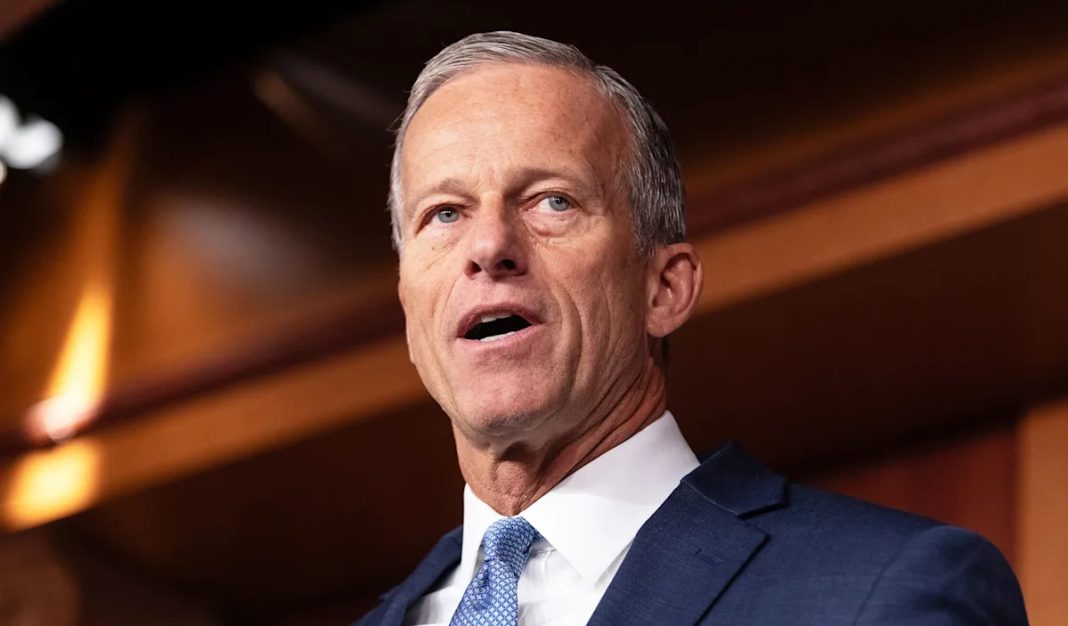For the first time since the shutdown began, senators this week began expressing some optimism that a solution might be right around the corner.
That optimism, however, will have to wait until next week, when food benefits have officially run out and Americans see their Obamacare premiums spike.
Senate Majority Leader John Thune, R-S.D., sent lawmakers home on Thursday after Republicans and Democrats failed to reach an agreement on the shutdown for the fifth consecutive week.
Still, senators told MSNBC on Thursday that bipartisan talks are happening and that, despite Thune not seeing enough progress to keep the chamber in session over the weekend — or even on Friday — there is finally some progress.
One GOP senator, who requested anonymity to discuss the sensitive deliberations, said some of the talks are focused on appropriations, while others are centered on health care premiums. But mostly, this senator said, discussions are concentrated on turning the lights back on in Washington.
“I actually am seeing some movement, or seeing more discussions,” another GOP senator, Kevin Cramer of North Dakota, said Thursday.
Sen. Jon Ossoff, D-Ga., echoed that sentiment, telling MSNBC he thought “the pace of bipartisan discussions is a good sign.”
Whether those discussions are close to bearing fruit is another question.
Democrats are still demanding that lawmakers address the expiring Obamacare tax credits as part of any deal to end the shutdown, while Republicans insist the only way to end the impasse is by passing the short-term spending bill that the House approved last month.
Despite the ramped-up conversations, that core disagreement still exists.
“There is talking going on,” Sen. Lisa Murkowski, R-Alaska, said. “But we need talks to yield results, right?”
That lack of results seemed to prompt Thune to send everyone home.
“We got to see something from the Democrats that suggests that would be a worthwhile endeavor,” Thune said Wednesday when asked if he would keep lawmakers in over the weekend. Asked if at least 10 Democrats have come to him saying they are ready to have a serious conversation about ending the shutdown, he responded: “No.”
Less than 24 hours later, he adjourned the Senate for the week.
The discussions between Democrats and Republicans haven’t exactly been leadership-sanctioned. And Democratic and GOP leaders haven’t been the ones engaging in talks. Thune maintains there’s nothing to discuss until Democrats vote for the House-passed continuing resolution. And Senate Minority Leader Chuck Schumer, D-N.Y., maintains that Democrats will need real concessions on Obamacare before his caucus votes for a spending bill.
The dynamic is similar in the House with Minority Leader Hakeem Jeffries, D-N.Y., who says it’s well past time to negotiate, and Speaker Mike Johnson, R-La., who says there’s nothing to negotiate and has kept the House out of session since Sept. 19 to back up his claim.
With leaders sticking to their positions, when the impasse finally breaks is anyone’s guess.
The shutdown is on track to make history. If it stretches into Wednesday — day 36 — it will be the longest funding lapse in history, surpassing the 35-day shutdown of 2018-19 during President Donald Trump’s first term, which centered on Trump’s demand for border wall funding and was only a partial shutdown.
But several senators say next week could be different, particularly as the effect of the shutdown gets uglier.
Beginning on Saturday, the Trump administration will not issue November’s food benefits to nearly 42 million Americans on the Supplemental Nutrition Assistance Program. That prospect alone could change the calculus for lawmakers, but add in nearly seven million women, infants and children not receiving special food benefits from WIC, 1.4 million federal workers missing paychecks, more than 60,000 children losing access to Head Start programs and airports seeing delays as air traffic controllers call in sick as a result of going unpaid, and the shutdown could become untenable even for the most dug-in lawmakers.
“It’s really reached the point of absurdity,” Sen. Josh Hawley, R-Mo., said of the shutdown. “It’s reached the point of real suffering for people. This isn’t just an inconvenience. People are really, really suffering now.”
On top of all the pain points, open enrollment for Obamacare begins this weekend, meaning many Americans will see drastically higher premiums because the enhanced tax credits are set to go away on Jan. 1.
While Republicans hope the pain of the shutdown will simply become too much for Democrats, Democrats hope those skyrocketing premiums will force Republicans to the negotiating table.
“The talks will go nowhere,” Sen. Richard Blumenthal, D-Conn., said, “if Republicans remain completely intransigent and resistant to any compromise on extending the health care coverage.”
Then there’s the president. Trump was overseas this week, effectively removing himself from the shutdown talks. With his return, there’s a possibility he gets involved — something Democrats have argued is the only way out of the shutdown.
“The off ramp is: Let’s get in a room. Let’s get the president actually in a room. Let’s get him to focus on this for more than an hour,” said Sen. Mark Kelly, D-Ariz.
And then there’s the potential political angle. Voters in New York, New Jersey and Virginia are headed to the polls on Tuesday for a slew of off-year elections. Republicans cynically believe Democrats have held out on the shutdown in some opaque election gambit.
“More than likely, I say we open next week after the elections,” Sen. Markwayne Mullin, R-Okla, said. “That’s it.”
Whether that’s actually a factor — or whether talks will finally reach a point of action, or whether the shutdown pain will finally become too much — remains to be seen. But even Thune, after adjourning the Senate for another week, seemed to have new hope.
“I’m always optimistic,” Thune said. “Aren’t you?”
This article was originally published on MSNBC.com

